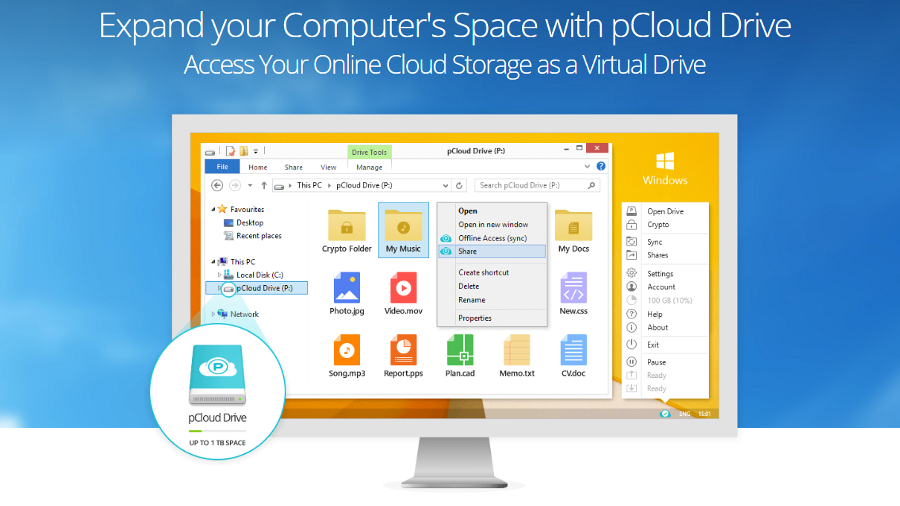- In a hurry? Our top pick for best cloud storage service is iDrive, our Editor's choice. $3.48 for 12 months is what you will pay for the first year.
Looking for the best cloud storage provider around right now? Well, we've got you covered with the most extensive, thoroughly-researched and complete buyers guide on all things cloud. Nobody has tested and reviewed more cloud storage services online than us
We have researched more than 40 of the best cloud storage providers to provide you with our curated list, ranking on aspects such as capacity, price, file size, security and ease of use.
What is a cloud storage service?
To understand what cloud storage means, you need to grasp what the cloud is. In one line, that's a resource (usually computing power or storage) that you can access remotely online either for free or for a fee.
Think of it as the self-storage services - cherished by home movers and renters - but instead of filling them up with boxes, you fill cloud storage accounts with your own files.
There are dozens of services that fall under that umbrella term (cloud storage) and many users interchangeably call them cloud backup, online storage, online drives, online backup, file hosting, file storage and so on.
At its simplest, it is a secure virtual space that you will usually access via your browser or an application (or a mobile app). The actual location of your files is usually in a data center somewhere, in a server, on a hard drive or solid-state drive.
Our experts have worked on a list that represents our top picks for the best cloud storage: most offer a free tier allowing you to see if they're right for you before handing over any hard-earned cash. Just make sure you read the terms and conditions.
Whether you need to store a couple of files, an operating system or entire collections of pictures, images or videos, we have something for everyone.
And if you can't find what you're after, check out some of our other guides, including the best free cloud storage, best photo storage and best business cloud storage roundups.
Best cloud storage services in 2020

1. IDrive is the best cloud storage provider
IDrive, the cloud storage veteran, delivers tons of storage online for an incredibly small outlay. 5TB for $3.48 for the first year is unmatched till now and so is the support for unlimited devices and the extensive file versioning system available.
View Deal

2. pCloud provides a lifetime cloud storage subscription
The Swiss-based company is more expensive than the competition but the one-off payment means that you won't have to worry about renewal fees that can be very horrendously expensive. $350 for 10 years is less than $3 per month.


1. IDrive cloud storage
Best overall choice thanks to a rock-bottom price
Free tier: 5GB | Storage size: 5TB | Number of devices: Unlimited
IDrive offers continuous syncing of your files, even those on network drives. The web interface supports sharing files by email, Facebook and Twitter. Cautious or click-happy users will be pleased to hear that files deleted from your computer are not automatically deleted from the server, so there's less danger of removing something important by accident.
Up to 30 previous versions of all files backed to your account are retained. Another thing to note is that IT admins have access to the IDrive Thin Client application, which allows them to backup/restore, manage settings, and more for all their connected computers via a centralized dashboard.
For photos, you have a neat facial recognition feature that helps you to automatically organize them as well as syncing them across all your linked devices. IDrive also offers IDrive Express which sends you a physical hard disk drive if you lose all your data, allowing for the swift restoration of all your backed up files.
An enhanced version - aptly named IDrive Business - exists and offers priority support, single sign-on as well as unlimited users and server backup. While IDrive Personal offers 5TB or 10TB per user, their professional counterparts get between 250GB and 12.5TB of online storage.

EXCLUSIVE IDrive 5TB plan | $69.50 $3.48 for 1 year | 95% off
$69.50 may seem a bit expensive for a year's worth of cloud storage but $3.48 for a whole 12 months is ridiculously cheap. Not to mention 5TB should go a very long way in covering even the most demanding storage needs.
View Deal

2. pCloud cloud storage
Best for those who want to pay for a one-off fee
Free tier: 10GB | Storage size: 2TB | Number of devices: 5
pCloud is one of the very few cloud services that offer lifetime subscriptions; you essentially get a virtual, permanent cloud drive. It describes itself as a "personal cloud space where you can store all your files and folders. It has a user-friendly interface that clearly shows where everything is located and what it does."
pCloud comes with 30-day trash history and unlimited remote upload traffic (you only need the URL of the file); you are - as expected - limited on the download link traffic: 500GB for the Premium package and 2TB for the Premium Plus package every month.
While some bandwidth limits apply, there seems to be no limit to the size of files you can upload, so feel free to sync large media files. The service is available for all desktop and mobile platforms – users can also log in via the website.
Note that as of August 2020, pCloud now allows its users to choose where they want their data to be stored, either EU or US. The company itself is registered in Switzerland which has strong privacy laws and you can also pay a premium of $4.99 a month for pCloud Crypto to lock (and unlock) individual files with passwords.
There's also a family option that allows you to share your space with up to four other family members and a superior option - pCloud Business - that offers 1TB per use with pCloud Crypto included.

pCloud 2TB lifetime cloud storage - $350
At face value, you might think pCloud's offering is a little on the expensive side. However, a one-off payment will be cheaper in the long run, because you won't have to worry about outrageous renewal fees. Plus, you can rest easy in the knowledge your data is secured by strong encryption and extensive redundancies.View Deal

3. Microsoft OneDrive cloud storage
Best for those who are invested with Microsoft Office
Free tier: 5GB | Storage capacity: 6TB | Number of devices: 30
Like Google Drive's appeal to Google users, OneDrive will be a good fit for anyone who is committed to using Microsoft's services, offering neat integration with Outlook.com, the company's popular email platform, for instance.
OneDrive also ties in nicely with Windows 10 and there is a selection of reasonable mobile apps to facilitate access on the move. It's also integrated with non-Microsoft services like design behemoth AutoCAD.
It's possible to share files with other people even if they aren't OneDrive users (complete with customizable permissions), and the ability to edit files online without downloading them is a welcome touch.
Coming from Microsoft – a company with plenty of money to throw at the cloud – it's a little disappointing to find that OneDrive doesn’t include more space free of charge. Free users get a mere 5GB of storage, although it's relatively inexpensive to increase this to 100GB.
If you have Microsoft 365 (formerly known as Office 365) either through your work, educational institution or private purchase, you'll automatically get 1TB of space per user for free with an option to boost it up. Just bear in mind that this is cloud storage at it simplest with barely any advanced features here.
The Pro version has a dark mode and tighter integration with Microsoft Teams. Note that Microsoft upped the file size limit on OneDrive from 15GB to 100GB. It means that just one file could fill up your entire OneDrive (the lower capacity tier).

Microsoft 365 Family | $99.99 for 1-year
This is the best value for money offer from Microsoft. 365 Family costs only $99.99 per year and provides you with 6TB of cloud storage in all, spread across six separate users. Other than the apps included (Outlook, Word, Excel, Access, Publisher, OneNote and PowerPoint), you get AI-powered creative tools and 60 minutes of Skype calling per month.
View Deal

4. Google Drive cloud storage
Best for those who are using G Suite by default
Free tier: 15GB | Storage capacity: 2TB | Number of devices: Unlimited
Google Drive is a natural choice for owners of Android devices as it's already integrated, but users of other platforms may appreciate the generous free storage too.
You can also store unlimited high definition photos on your mobile phone with companion app Google Photos, and make use of Google's own office suite (now known as G Workspace). Also, individuals upgrading to paid Google Drive plans will join Google One (although it might not yet be available, depending on the region).
The array of features delivered by Google Drive via One - which ties into Google's Cloud platform - is bewildering and evolves continuously. At the time of writing, Google engineers were rolling out the ability to request approvals for Drive items and lock approved versions.
The 2TB tier - which offers 10% back in Google Store credits - allows the main account holder to invite up to five other additional members and costs $99.99 per year.
Downsides include the fact that the web interface isn't very easy-to-use, although Windows and Mac users can download a desktop app to drag-and-drop files easily. Drive also integrates Google's powerful AI and search technology, probably one of the best in the world.

Google One (2TB) | $99 for 1-year
Google offers One as a membership, a quasi-lifetime commitment that's not unlike Amazon Prime. Although you get unlimited storage for your photos (terms and conditions apply), you "only" get 2TB to play with via Google Drive. You can share it among up to six members and Google Experts are only a phone call away should you want to.View Deal
How does cloud storage work?
Believe it or not, the concept of cloud storage has been around for a long, long time. Amazon popularized the concept with its S3 (Simple Storage Service) launched in 2006 but the ability to upload and save files remotely on a service provider's disk drive can be traced back to 1983's Compuserve offer.
At the end of the day, you are simply using someone else's resources (part of whole of a hard drive, a solid state drive or even tape) to store your information.
That resource is usually located in a server housed in a data center (but not always) alongside potentially hundreds of others. The process is done over the internet over a secure connection via a dedicated app or via a web browser.
Almost everyone who has a smartphone or an email address has a cloud storage account of some sort. One might even consider Facebook to offer a limited version of cloud storage to its members as videos and photos can be uploaded free of charge to its servers.
- Stay safer online with a Virtual Private Network - discover the best VPN

0 comments:
Post a Comment